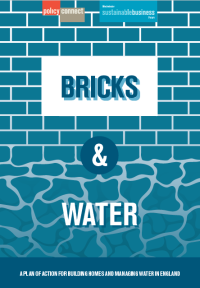Bricks and Water: A plan of action for building homes and managing water in England
On 19 June 2018, the Westminster Sustainable Business Forum (WSBF) published ‘Bricks and Water: A plan of action for building homes and managing water in England’, an evaluation of the way water and housing policy is being implemented in England, aimed at formulating a plan of action for building homes and managing water.
The structure and content of the report was informed by a steering group including politicians and representatives from industry and academia. It was co-chaired by Angela Smith MP and Baroness McIntosh, both of whom have considerable experience in the water sector.
The report includes recommendations for tackling the housing crisis whilst improving flood resilience and water availability without over-burdening future generations with increased costs.
The key findings of the report are:
- By 2050, with a projected population increase of 8.7 million, water demand could exceed supply by up to 22%.
- By 2050, 129% more homes (nearly 2.5 million) may be at risk of flooding.
- By 2050, an additional 4 billion litres of water will be required.
- The design of new-build houses must consider water efficiency and flood resistance.
- Continuing cuts to the budgets of environment bodies negatively impacts on their ability discharge their responsibilities.
- There has been limited progress on adapting communities to climate change, and just 42% of local authorities have an adaptation plan/strategy.
- There is no designated forum for problem-solving between water companies, housebuilders and local authorities.
- The planning system is overloaded and too focused on local issues.
- Water is not sufficiently factored into value-for-money decisions at the institutional or householder level and the importance of water efficiency measures is not recognised adequately.
- Evidence suggests that new homes tend to be less water efficient than expected.
- Sustainable Urban Drainage Systems (SUDS) have not become the norm with developers, drainage engineers or housebuilders.
- The UK risks a lack of environmental standards if they are no longer legally enforced independently post-Brexit.
The report made the following recommendations:
- The government should urgently introduce a mandatory ‘Bricks and Water Sustainability Code’ as a tougher and simpler planning framework.
- The Environment Secretary’s new strategic body should be truly independent and provide leadership on water management.
- Water issues should be tackled at the sub-national as well as national level to address flooding challenges.
- Property Resilience Certificates (based on BRE’s Home Quality Mark), and water efficiency labelling for fixtures and fittings should be introduced.
- Green, rather than concrete, infrastructure should be prioritised as the norm for homes and communities.
- DEFRA should prioritise the management of water as a public good.
The Westminster Sustainable Business Forum (WSBF) is a high-level coalition of key UK businesses, parliamentarians, civil servants and other organisations, seeking to promote effective sustainability policy in the UK. It is part of Policy Connect, a cross-party think tank that seeks to improve people’s lives by influencing public policy.
You can download the report here.
[edit] Find out more
[edit] Related articles on Designing Buildings Wiki
- Flood and Water Management Act
- Groundwater control in urban areas.
- Home Quality Mark.
- Sustainable urban drainage systems.
- Sustainable water.
- The State of the Environment: Water Resources.
- Trading systems for water resources.
- Urban water systems management: A data analytics approach EP 105.
- Water Act 2014.
- Water efficiency – The next big sustainability issue?
- Water framework directive.
- Water industry pressures.
- Water investment.
- Water transfers and interconnections.
- World Water Day.
Featured articles and news
Call for greater recognition of professional standards
Chartered bodies representing more than 1.5 million individuals have written to the UK Government.
Cutting carbon, cost and risk in estate management
Lessons from Cardiff Met’s “Halve the Half” initiative.
Inspiring the next generation to fulfil an electrified future
Technical Manager at ECA on the importance of engagement between industry and education.
Repairing historic stone and slate roofs
The need for a code of practice and technical advice note.
Environmental compliance; a checklist for 2026
Legislative changes, policy shifts, phased rollouts, and compliance updates to be aware of.
UKCW London to tackle sector’s most pressing issues
AI and skills development, ecology and the environment, policy and planning and more.
Managing building safety risks
Across an existing residential portfolio; a client's perspective.
ECA support for Gate Safe’s Safe School Gates Campaign.
Core construction skills explained
Preparing for a career in construction.
Retrofitting for resilience with the Leicester Resilience Hub
Community-serving facilities, enhanced as support and essential services for climate-related disruptions.
Some of the articles relating to water, here to browse. Any missing?
Recognisable Gothic characters, designed to dramatically spout water away from buildings.
A case study and a warning to would-be developers
Creating four dwellings... after half a century of doing this job, why, oh why, is it so difficult?
Reform of the fire engineering profession
Fire Engineers Advisory Panel: Authoritative Statement, reactions and next steps.
Restoration and renewal of the Palace of Westminster
A complex project of cultural significance from full decant to EMI, opportunities and a potential a way forward.
Apprenticeships and the responsibility we share
Perspectives from the CIOB President as National Apprentice Week comes to a close.






















